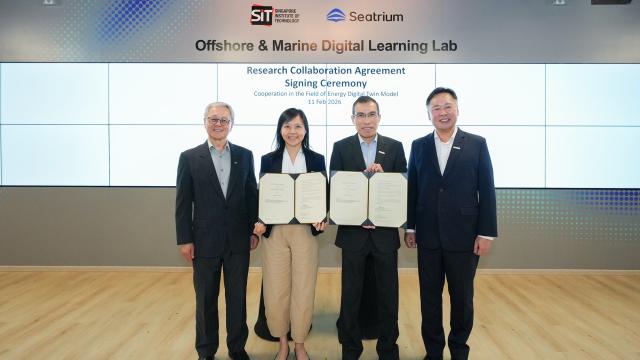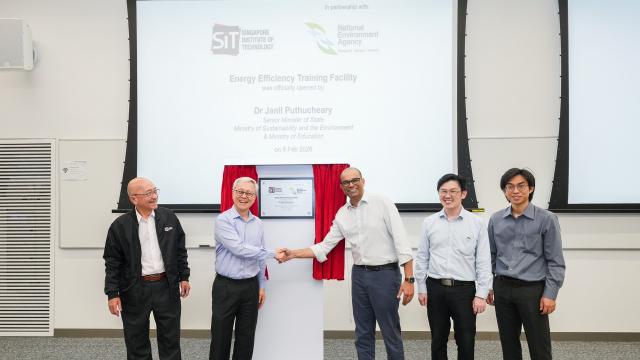- Design Your Futures (DYF) equips SIT students and alumni with the framework and tools to chart their career and life paths
- Career coaching to be extended to SIT alumni
- Class of 2025 includes pioneer cohorts of robotics systems engineering, applied artificial intelligence, digital supply chain, applied computing in fintech, and maritime engineering undergraduate degree programmes, as well as health sciences postgraduate degree programmes
- First Convocation ceremonies to take place at Punggol Campus
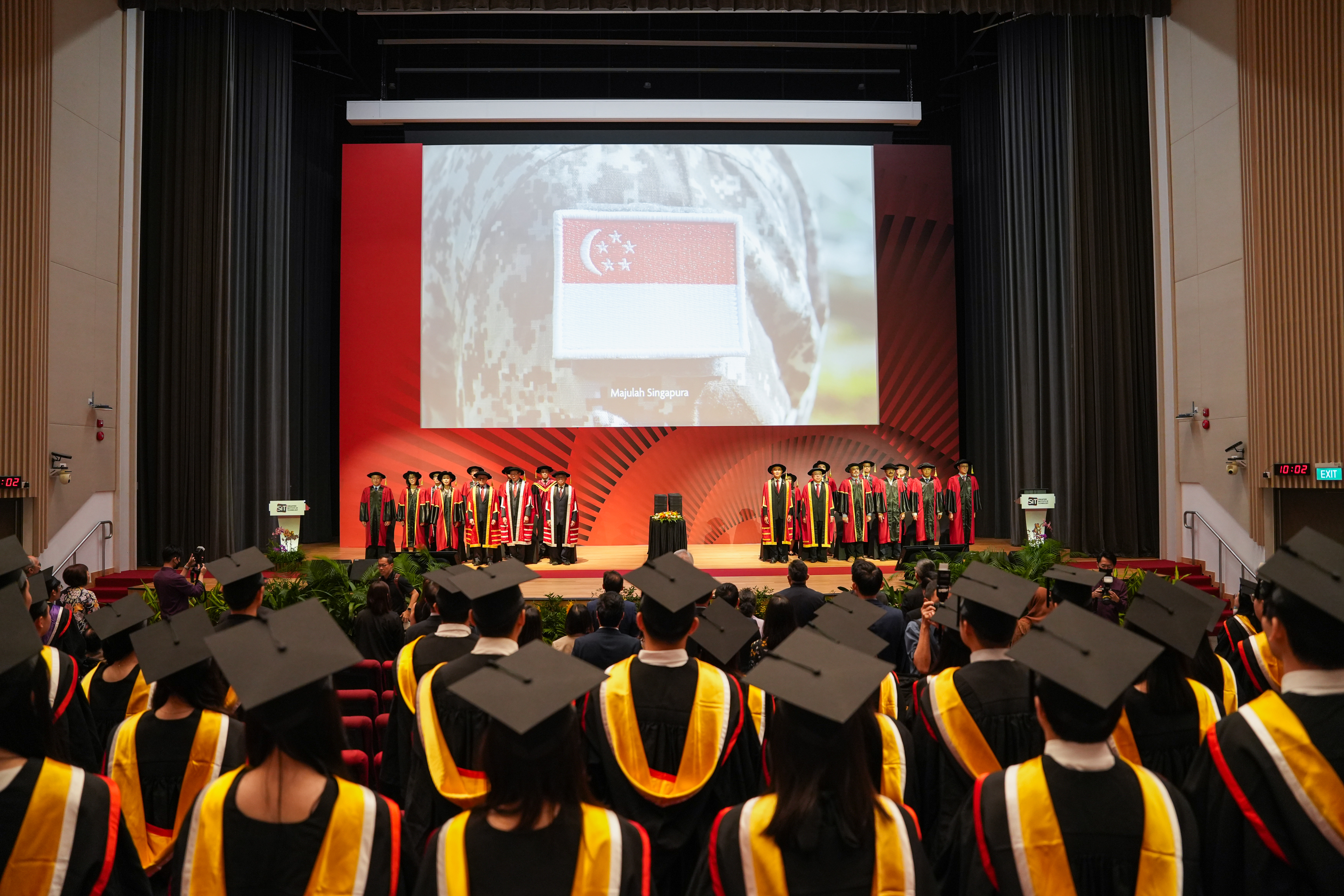
SIT Convocation 2025 (Photo: SIT / Keng Photography)
In a world where careers are no longer linear and the relevance of skills is changing faster than ever, the Singapore Institute of Technology (SIT) is redefining how it empowers its graduates for lifelong success. Responding to the accelerating pace of technological disruption and evolving workplace demands, SIT today unveiled its new Design Your Futures (DYF) programme, a multiple touchpoint initiative designed to help its students and alumni chart purposeful and adaptable career and life paths. At the same time, SIT announced the extension of its career coaching services to its alumni, underscoring the University’s commitment to supporting its students and alumni throughout their career journeys.
The announcement was made during the University’s first session of Convocation 2025, held for the first time at SIT’s new Punggol Campus. The convocation spans 14 sessions from 13 to 17 October. Deputy Prime Minister and Minister for Trade and Industry Gan Kim Yong graced the first ceremony as Guest-of-Honour.
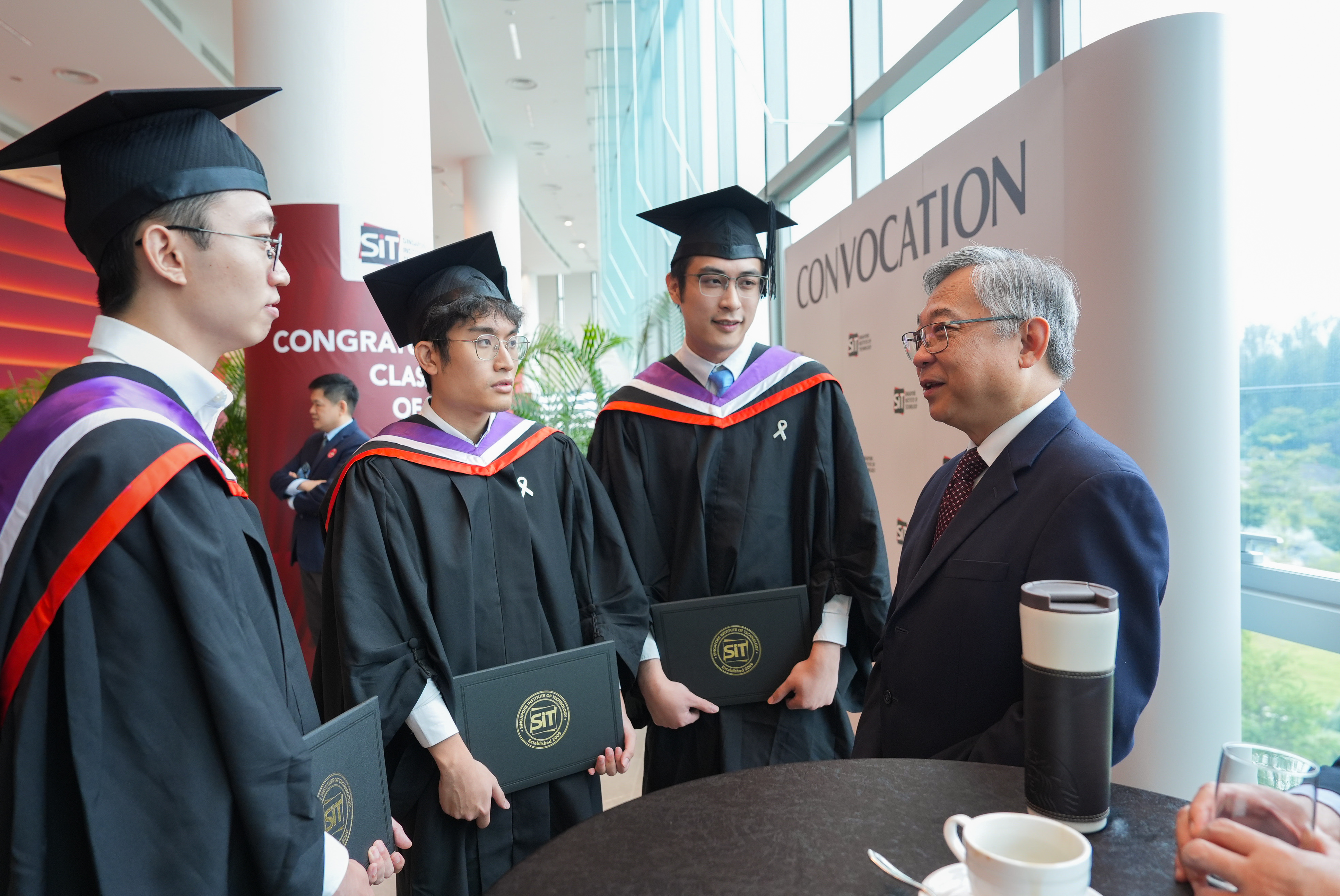
Guest-of-Honour Deputy Prime Minister and Minister for Trade and Industry Gan Kim Yong interacting with SIT graduates at SIT Convocation 2025. (Photo: SIT / Keng Photography)
Design Your Futures (DYF): Equipping SITizens to Navigate the Future with Confidence
Rooted in design and futures thinking, DYF empowers students to explore their identities and aspirations during their time at SIT, guiding them on a journey of self-discovery and personal growth. Developed with the support of the Life Design Lab at Stanford University and the Designing Your Life Institute through a Memorandum of Understanding, DYF integrates the ‘Designing Your Life’[1] and ‘Personal Futures Thinking’[2] frameworks. Amid rapid technological advancements and evolving workforce demands, this initiative prepares SITizens – both students and alumni – to thrive across a lifetime of diverse careers. By empowering SITizens to actively explore, prototype, and test different possible futures through small, actionable steps, the initiative helps SITizens move from feeling uncertain to being motivated, and from passive reflection to intentional, purposeful action.
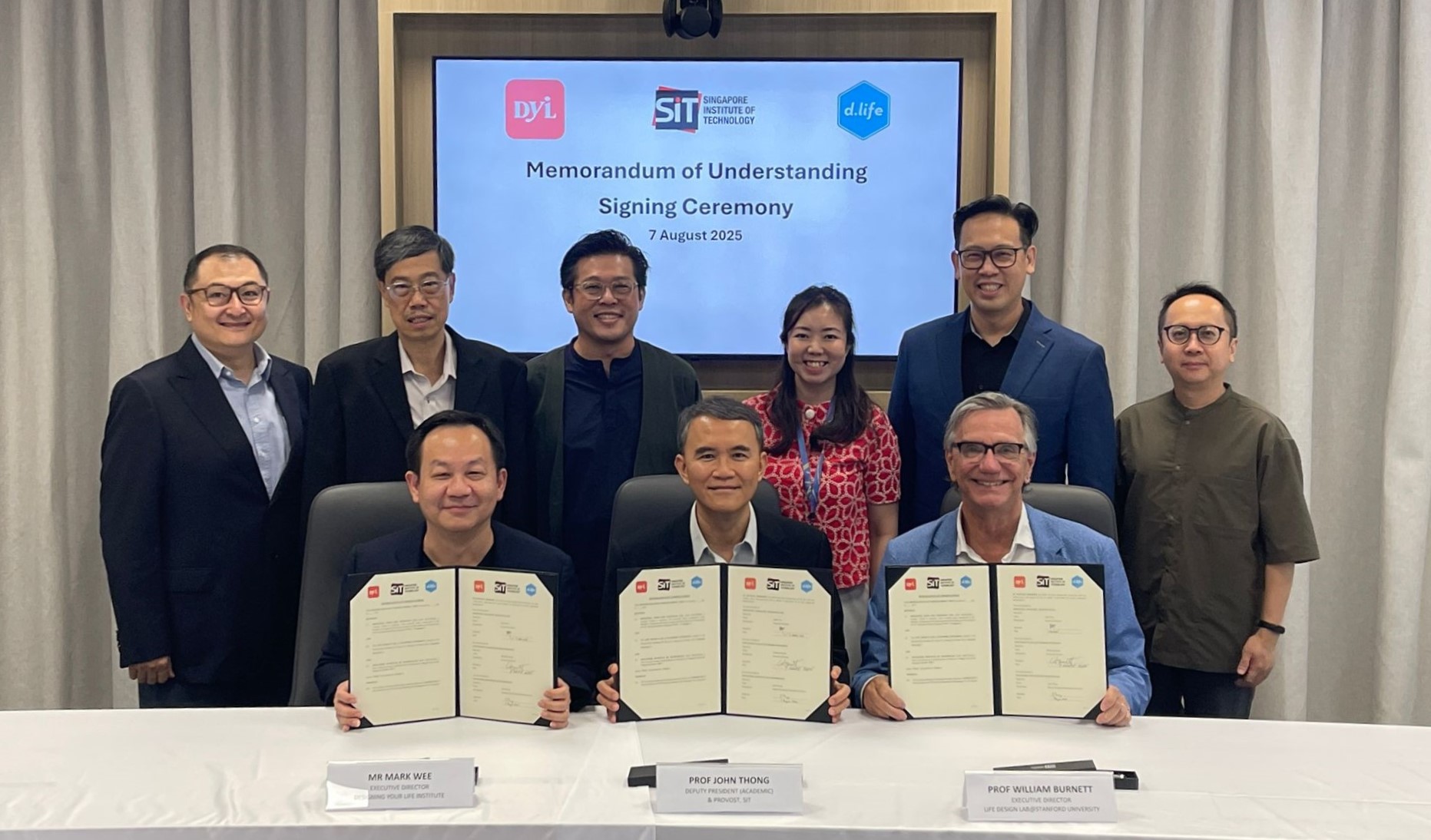
SIT signed an MOU with Stanford Life Design Lab and Designing Your Life Institute Singapore on 7 August 2025 at SIT Punggol Campus. (Front Row, from left) Mark Wee, Executive Director of Designing Your Life Institute; Prof John Thong, Provost, SIT; Professor Bill Burnett, Executive Director of Stanford Life Design Lab. (Back Row, from left) Robin Ngan, Director, SITLEARN, SIT; Professor Ng Siu Choon, Director, Office of the Provost at SIT; Design Innovation Teaching faculty members at SIT, Assistant Professor Mark Teo, Associate Professor Agnes Xue, Associate Professor Jawn Lim, and Associate Faculty Renjie Zheng.
Through experiential activities, students learn to clarify what matters most to them, challenge limiting beliefs, and align their decisions with their evolving personal and professional goals. This continues throughout their time at SIT; students map out their plans, tweak them as their experiences change and conversations and reflections at various touchpoints happen. In this way, DYF equips SITizens with anticipatory decision-making skills to help plan their professional paths with confidence, as well as help cultivate a growth mindset and mental agility to navigate the complexities of an ever-evolving world. This hands-on, reflective approach helps SITizens design futures that are adaptable, values-driven, and uniquely their own.
Rolled out to all undergraduates since the start of Academic Year 2025 (September), DYF is embedded throughout the SIT undergraduate experience as a multi-touchpoint learning journey. Beginning as early as the ‘Day Zero’ freshman orientation, the DYF framework continues through the university-wide Design Innovation module[3], and is extended into the Integrated Work Study Programme[4]. Academic Advisors will also use the DYF framework in their regular check-ins with students.
From January 2026, SIT alumni can enroll in DYF to support their career transitions and professional growth. Alumni can tap on their Learn for Life[5]credits to enroll in this initiative, which combines a two-day (16-hour) intensive workshop with a three-hour follow-up reflection session six months later. This streamlined version of DYF blends hands-on activities, guided practice, and reflective learning to support career transitions and ongoing professional development. Alumni can sign up at https://www.singaporetech.edu.sg/sitlearn/courses/business-communication-design/design-your-futures.
A tailored version of the alumni course will also be introduced for future graduates who have embarked on DYF in their undergraduate studies, enabling them to revisit their personal life designs and explore new pathways as their professional lives evolve.
Mohamed Ameenkhan S/O Ajmalkhan, a Year 2 Aircraft System Engineering student who participated in a pilot run of DYF shared, “The DYF programme helped me adopt a bigger perspective on life. Life isn’t a single straight path. DYF challenged me to think deeply and creatively, and explore alternative futures beyond the one I had in mind.”
Extended Career Coaching for Alumni
To further strengthen support for SITizens beyond graduation, SIT is extending career coaching to all alumni. This builds on SIT’s established student career ecosystem to equip SITizens with practical strategies for navigating career transitions and seizing career opportunities. SITizens will be able to tap on a range of career support — including career coaching, resume review, interview preparation and job search strategies. These will be available to both students and alumni, equipping them to remain adaptable and competitive throughout their career journeys. For alumni, the guidance will be tailored to individual needs and industry trends, helping them navigate real-world challenges and career transitions. For needs beyond SIT’s core offerings, SIT will connect SITizens to external resources, allowing them to access extended support beyond the university.
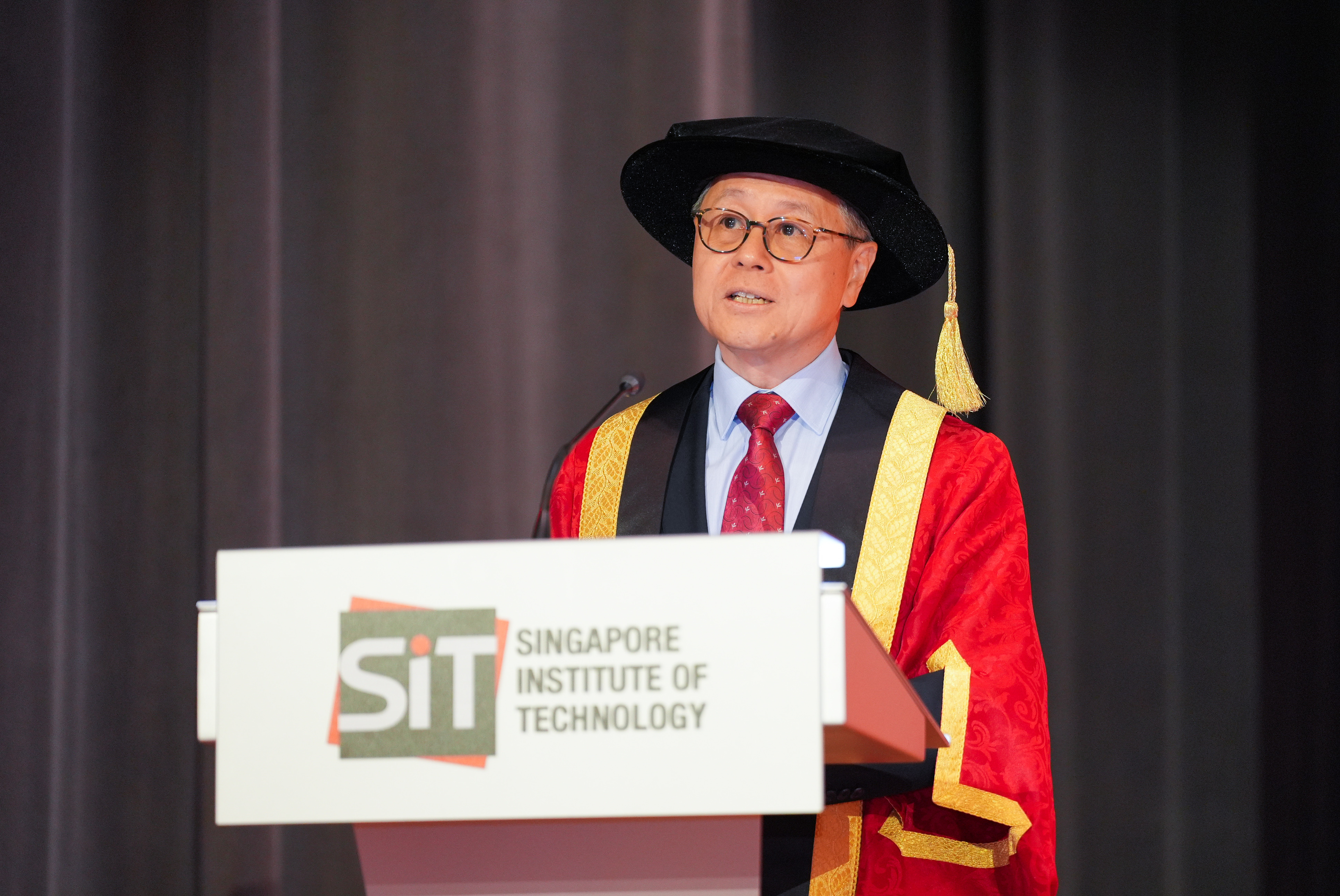
SIT President Prof Chua Kee Chaing announced the university's reinforced commitment to supporting SIT alumni through the launch of DYF and extended career coaching services. (Photo: SIT / Keng Photography)
As Singapore’s University for Industry, SIT will continue to leverage its extensive industry networks and partnerships to benefit its alumni — from industry networking events, and alumni career dialogues held throughout the year, to talent matching sessions co-organised with employers across key sectors. Alumni can also benefit from professional alumni community gatherings, alumni reunions, and thought-leadership events organised by the University, which keep SITizens connected with one another and with the wider industry community.
Together, these initiatives form a holistic framework of career support that SIT provides to its alumni SITizens. DYF empowers SITizens to develop the mindset and tools to imagine and design meaningful futures. Career coaching for alumni provides practical, hands-on guidance to put these plans into action — from job search strategies to interview preparation. These aim to equip SITizens with the skills and agility needed for long-term career success and adaptability.
SIT President Professor Chua Kee Chaing said, “Our graduates are entering a world where agility and resilience are critical. With DYF and extended career coaching for alumni, we aim to equip them with the confidence, skills and networks to adapt and thrive in a rapidly evolving future. Echoing our ‘Once a SITizen, Always a SITizen’ ethos, SIT reaffirms our commitment as a lifelong career partner, journeying with and walking alongside SITizens at every stage of their careers.”
Pioneer Graduates Ready to Contribute to Emerging Industries
Over 2,900 graduates from 52 undergraduate and postgraduate degree programmes will receive their scrolls at this year’s Convocation. Among them are more than 1,570 graduates from SIT-conferred degree programmes, over 1,280 from joint-degree programmes with SIT’s overseas university partners, and close to 140 from the programmes of SIT’s overseas university partners.
This year’s Convocation also marks the graduation of pioneer cohorts from seven programmes, developed in response to industry needs:
| Programme | Number of Graduates |
| Undergraduate Programmes | |
| Bachelor of Engineering with Honours in Robotics Systems | 27 |
| Bachelor of Science with Honours in Digital Supply Chain | 42 |
| Bachelor of Science with Honours in Applied Artificial Intelligence | 46 |
| Bachelor of Science with Honours in Applied Computing (Fintech specialisation) | 29 |
| Bachelor of Engineering with Honours in Naval Architecture and Marine Engineering | 59 |
| Postgraduate Programmes | |
Doctor of Clinical Research in Health Sciences Master of Health Sciences | 13 |
Designed to equip graduates with specialised, future-ready skills, these programmes were developed in close consultation with industry to address their needs in automation, digitalisation, and healthcare. These programmes also feature extensive industry exposure through deep projects and work attachments, enabling students to apply their knowledge in real-world settings and build meaningful connections with leading organisations.
• Bachelor of Engineering with Honours in Robotics Systems
As Singapore’s first degree of its kind, the Robotics Systems engineering degree integrates multiple engineering disciplines including mechanical, electronics and software engineering, and features a project-based pedagogy, nurturing engineers capable of designing and deploying advanced robotics solutions across industries.
• Bachelor of Science with Honours in Digital Supply Chain
Designed to address the evolving needs of logistics and supply chain operations, the interdisciplinary Digital Supply Chain programme blends infocomm technology, engineering and supply chain strategies. Graduates are equipped with competencies in data-driven decision-making, automation, and digital platforms, equipping them to optimise supply networks to enhance resilience in global trade.
• Bachelor of Science with Honours in Applied Artificial Intelligence
The Applied Artificial Intelligence programme focuses on practical AI applications in sectors such as healthcare, manufacturing, and finance. With a strong emphasis on real-world problem solving and ethical AI deployment, graduates are trained in machine learning, data analytics, and intelligent systems, and their applications in different vertical domains.
• Bachelor of Science with Honours in Applied Computing (Fintech specialisation)
This programme integrates computing fundamentals with financial technologies, preparing graduates to innovate in areas such as blockchain, digital payments, and financial analytics. Graduates are trained to bridge the gap between tech and finance, contributing to Singapore’s position as a global fintech hub.
• Bachelor of Engineering with Honours in Naval Architecture and Marine Engineering
The SIT-Newcastle University joint Naval Architecture and Marine Engineering degree programme, the only such programme offered in Singapore, was redesigned in Academic Year 2022 through the merger of three former degree programmes: Naval Architecture, Marine Engineering, and Offshore Engineering. This streamlined three-year degree integrates the core strengths of these disciplines to better prepare students for the maritime sector’s shift towards digitalisation, decarbonisation, offshore renewables, and sustainable marine and offshore design. With specialisations in naval architecture, marine engineering, and offshore engineering offered in the upper years, the programme supports Singapore’s maritime ambitions by developing engineers with expertise in both traditional engineering and emerging green technologies.
• Doctor of Clinical Research in Health Sciences
A pioneering applied doctoral degree in clinical research, the programme bridges clinical practice and scientific inquiry. Graduates are clinician-researchers with advanced competencies in study design, data analysis, and translational research, strengthening the nation’s healthcare innovation ecosystem.
• Master of Health Sciences
The MHSc programme empowers allied health professionals to take on expanded roles in patient care through advanced training in areas including sonography and clinical leadership. Exemplifying SIT’s commitment to interdisciplinary healthcare education, its graduates are prepared for the transformation of clinical practice through innovation and technology.
About Singapore Institute of Technology
As the university for industry and Singapore's first university of applied learning, the Singapore Institute of Technology (SIT) offers industry-relevant degree programmes that prepare its graduates to be work- and future-ready professionals. Its mission is to maximise the potential of its learners and to innovate with industry, through an integrated applied learning and research approach, so as to contribute to the economy and society.
The University’s unique pedagogy integrates work and study, embracing authentic learning in a real-world environment through collaborations with key strategic partners. Its focus on applied research with business impact is aimed at helping industry innovate and grow. SIT’s new centralised campus within the larger Punggol Digital District features a vibrant learning environment where academia and industry are tightly integrated with the community.
For more information, visit www.SingaporeTech.edu.sg
Annex A – About the Design Your Futures (DYF) Programme
Empowering SITizens to Design Lives of Purpose and Possibility
Design Your Futures (DYF) is SIT’s core university-wide future-readiness and life design initiative for both students and alumni. It equips SITizens with the mindset, tools, and frameworks to intentionally shape careers and lives that are both purposeful and adaptable in a fast-changing world. Anchored in SIT’s commitment to be a lifelong learning and career partner, DYF focuses on teaching learners to design multiple possible futures rather than planning for a single prescriptive career path.
Programme Objectives
DYF aims to:
- Cultivate a future-ready mindset that embraces exploration, adaptability, and resilience.
- Equip SITizens with the Design Thinking and Futures Thinking tools and frameworks to design purposeful and adaptable career and life paths, and navigate uncertainty with clarity.
- Foster creative confidence, mental agility, and a growth mindset to thrive in a rapidly evolving world.
- Help learners discover coherence between who they are (life view, values and strengths), what they believe (worldview), and what they do (career choices).
- Foster a lifelong learning attitude that extends beyond graduation, empowering alumni to revisit and redesign their futures as their aspirations evolve.
Programme Framework
DYF integrates two globally recognised methodologies:
- Designing Your Life (DYL) – a framework developed at Stanford University that applies design thinking to life and career choices.
- Personal Futures Thinking (PFT) – a foresight-based approach that helps individuals anticipate and plan for multiple possible futures.
These frameworks are woven throughout SIT’s educational journey through experiential workshops, reflective exercises, and guided coaching, enabling SITizens to translate reflection into purposeful action.
Key Learning Components
The DYF curriculum introduces practical concepts and tools such as:
- Views – exploring various perspectives on work and life.
- Coherence – aligning work and life aspirations to create a purposeful future.
- Reframing – shifting perspectives to overcome limiting beliefs and challenges.
- Prototyping – testing new ideas through small, actionable steps to discover meaningful paths forward in their life and career journeys, such as trial experiences or conversations.
- Personal Futures Wheel – mapping the direct and indirect effects of various life decisions.
SITizens are guided through a series of structured activities that encourage them to:
- Reflect and reframe challenges as opportunities for growth
- Prototype ideas to test different directions
- Visualise multiple futures
- Align their plans with their personal values, motivations, and sense of purpose.
By moving from abstract reflection to tangible experimentation, SITizens gain the confidence to take ownership of their paths forward.
Intended Outcomes
Through DYF, SITizens will:
- Gain clarity on their personal values, strengths, and aspirations, and how these align with their professional goals.
- Build confidence to explore and test new directions through small, actionable steps.
- Develop futures literacy, the ability to anticipate, imagine, and prepare for a range of career and life possibilities.
- Strengthen decision-making skills for complex and uncertain environments.
- Adopt a lifelong learning mindset, continually revisiting and refining their plans as their goals evolve.
Integration Across the SIT Journey
DYF is not a one-off workshop, but a multi-touchpoint experience embedded across the SIT curriculum for undergraduates. It is delivered progressively through key touchpoints in the SIT learning journey, such as:
- Freshmen Orientation (Day Zero): Early introduction to life design principles to foster self-awareness and goal setting.
- Design Innovation Module: Application of Design Thinking and Futures Thinking to real-world challenges.
- Social Innovation Project Module[6]: Applying the experiences from the Social Innovation Project into new personal plans.
- Integrated Work Study Programme (IWSP): Reflection and redesign of career plans based on authentic industry experience.
- Academic Advisor Conversations: Continued guidance to connect life and career goals throughout the student journey.
This structured approach ensures that SITizens build and refine their personal and professional trajectories throughout their studies.
Extension to Alumni (from 2026)
From January 2026, SIT will extend DYF to all SIT alumni as a Continuing Education and Training (CET) course. The course will be offered as a two-day (16-hour) intensive workshop with a three-hour follow-up reflection session six months later.
- Alumni can tap on their ‘Learn for Life’ credits, which allows them to take one complimentary CET module every five years (worth up to S$3,500).
- There will be facilitated peer learning, guided exercises, and tools to help alumni navigate transitions, explore new directions, or realign goals in different life stages.
- Alumni can sign up at https://www.singaporetech.edu.sg/sitlearn/courses/business-communication-design/design-your-futures.
- For future graduates who have experienced DYF during their undergraduate studies, a tailored version of the CET course will be introduced to allow them to revisit and refine their personal life designs as their careers evolve.
[1] ‘Designing Your Life’ is a popular course developed by Stanford professors Bill Burnett and Dave Evans. It applies design thinking as a problem-solving approach to help people create a fulfilling and meaningful life.
[2] Verne Wheelwright's ‘Personal Futures’ is a pioneering approach that brings futures thinking down to the individual level. While traditional foresight is often used by governments and corporations, Wheelwright’s work empowers individuals to apply strategic foresight to their own lives.
[3] The Design Innovation module is a compulsory module built on trans-disciplinary teams working together to solve a Design Thinking and Futures Thinking project challenge together.
[4] The Integrated Work Study Programme (IWSP) is a distinctive feature of SIT's degree programmes. It is an eight- to 12-month work attachment that allows students to integrate theory and practice, and to develop deep specialist skills in their chosen field through.
[5] Learn for Life is an SIT initiative offering alumni a complimentary course or module every five years (valued up to S$3,500), empowering lifelong learning and career resilience.
[6] The Social Innovation Project Module is a compulsory, interdisciplinary module where students co-create practical solutions with community partners to address real-world social and sustainability challenges.















![[FA] SIT One SITizen Alumni Initiative_Web banner_1244px x 688px.jpg](/openhouse2025/openhouse/centre-professional-communication/sit-teaching-and-learning-academy/sit-teaching-and-learning-academy/directory/centre-professional-communication/sites/default/files/2024-12/%5BFA%5D%20%20SIT%20One%20SITizen%20Alumni%20Initiative_Web%20banner_1244px%20x%20688px.jpg)
